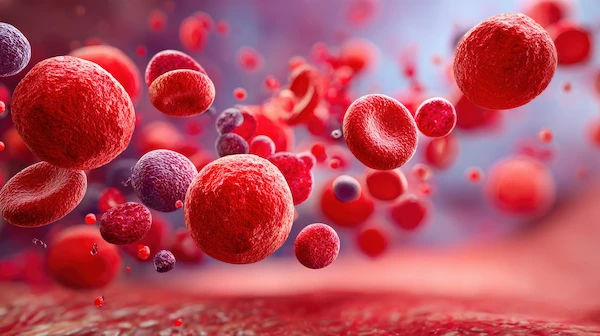How to Reduce Cortisol in PCOS: A Comprehensive Guide
Struggling with high cortisol in PCOS? Discover effective ways to lower stress hormones through diet, exercise, sleep, and lifestyle changes to improve your overall health.

Written by Dr.Sonia Bhatt
Last updated on 3rd Jul, 2025
.webp?tr=q-80,f-webp,w-350,dpr-2,c-at_max 700w)
Introduction
Polycystic Ovary Syndrome (PCOS) is one of the most common hormonal disorders among women of reproductive age. Affecting approximately 1 in 10 women globally, PCOS can lead to a variety of symptoms like irregular periods, excess facial or body hair, acne, and, perhaps most significantly, fertility challenges. One of the lesser-known but crucial factors involved in PCOS is cortisol, often referred to as the "stress hormone." In this article, we will discuss the connection between cortisol and PCOS, how it affects your health, and, more importantly, how to reduce cortisol levels to improve overall health and well-being.
What is Cortisol?
Cortisol is a hormone produced by the adrenal glands, which are located above your kidneys. It is often known as the "stress hormone" because it is released during stressful situations as part of the body's fight-or-flight response. Cortisol plays several vital roles, including regulating blood sugar levels, managing inflammation, controlling the sleep-wake cycle, and assisting in metabolism.
However, when cortisol levels are consistently elevated—due to chronic stress, poor lifestyle habits, or certain medical conditions—it can significantly affect your body. High cortisol levels are linked to weight gain, high blood pressure, anxiety, digestive problems, and, in the case of women with PCOS, a worsening of the hormonal imbalance that already exists.
Cortisol and PCOS: The Connection
PCOS is characterised by an imbalance of hormones, which includes higher levels of androgens (male hormones) and often insulin resistance. Stress, both physical and emotional, can increase cortisol production. Elevated cortisol levels, in turn, can worsen the hormonal imbalance in women with PCOS. The connection works in several ways:
Insulin Resistance and Cortisol: When cortisol (a stress hormone) levels are high, it can make the body less responsive to insulin, a common problem in PCOS. This means the body's cells don't respond well to insulin, causing insulin and cortisol levels to rise even more. This makes the hormonal imbalances in women with PCOS worse.
Weight Gain: High cortisol levels promote fat storage, particularly in the abdominal area. This can lead to further weight gain, a common issue for women with PCOS. Belly fat is also associated with higher inflammation, which worsens the symptoms of PCOS.
Stress and Hormonal Imbalance: Emotional and psychological stress can lead to the release of cortisol, and when cortisol levels remain high for prolonged periods, it disrupts the production of other hormones like estrogen and progesterone. This imbalance can lead to irregular menstrual cycles, ovulation issues, and even infertility in women with PCOS.
Symptoms of High Cortisol in PCOS
It's important to know if your cortisol (stress hormone) levels are high, especially if you have PCOS. Some signs to look out for are:
Weight Gain: Especially around your belly.
Fatigue: Always feeling tired, even after sleeping.
Mood Swings: Feeling more irritable, anxious, or depressed than usual.
Sleep Issues: Difficulty falling asleep, staying asleep, or waking up feeling unrested.
Acne or Oily Skin: High cortisol (stress hormone) levels can worsen these skin problems.
Digestive Problems: Stress can cause bloating, constipation, or diarrhoea.
Recognising these signs can help you manage stress and improve your health.
How to Reduce Cortisol in PCOS: Effective Strategies
Reducing cortisol levels can help manage the symptoms of PCOS and improve your overall health. Below are several evidence-based strategies that can help:
1. Stress Management and Mindfulness Techniques
Since stress is one of the primary triggers for cortisol release, managing stress effectively is key to reducing cortisol levels. Here are some techniques that can help:
Meditation and Deep Breathing: Mindfulness meditation or simple deep breathing exercises can significantly reduce stress. Just a few minutes each day can promote relaxation and lower cortisol levels.
Yoga: Yoga has been shown to help balance cortisol levels. Poses like a child’s pose forward folds, and gentle twists activate the parasympathetic nervous system, promoting relaxation and reducing stress.
Progressive Muscle Relaxation (PMR): This technique involves tensing and then relaxing different muscle groups throughout the body. PMR helps reduce the physical tension that often accompanies stress.
Cognitive Behavioral Therapy (CBT): This is a type of therapy that helps people manage stress and anxiety by changing negative thoughts. It has successfully lowered stress hormone (cortisol) levels and made people feel better emotionally.
2. Exercise Regularly – But Don’t Overdo It
While exercise is essential for managing PCOS symptoms, the type and intensity of exercise matter regarding cortisol levels.
Moderate Intensity Exercise: Walking, swimming, cycling, or strength training for 30 minutes daily can help regulate cortisol levels, reduce stress, and improve insulin sensitivity.
Don't Overexercise: Doing too much intense exercise can raise cortisol (stress hormone) levels and worsen the hormonal imbalances in PCOS. Finding a balance and avoiding pushing yourself too hard physically is essential.
3. Get Enough Sleep
Sleep is crucial for hormone regulation, including cortisol production. Chronic sleep deprivation can significantly elevate cortisol levels. Aim for 7-9 hours of sleep per night to allow your body to recover and regulate hormone production.
Establish a Sleep Routine: Going to bed and waking up simultaneously helps stabilise your circadian rhythm, promoting better sleep and reducing cortisol.
Create a Relaxing Bedtime Ritual: Avoid electronic devices, caffeine, and heavy meals before bed. Instead, indulge in calming activities like reading or taking a warm bath.
4. Eat a Balanced Diet
A healthy diet is essential for managing cortisol levels and supporting overall hormonal balance, especially for women with PCOS.
Reduce Sugar and Refined Carbohydrates: High sugar intake can spike insulin levels, triggering cortisol production. Focus on eating whole, unprocessed foods like vegetables, lean proteins, whole grains, and healthy fats.
Increase Omega-3 Fatty Acids: Omega-3s found in fatty fish, flaxseeds, and walnuts have anti-inflammatory properties and can help reduce cortisol levels.
Eat Anti-Inflammatory Foods: Eating foods with antioxidants, like berries, green leafy vegetables, and nuts, can help reduce inflammation and lower cortisol (stress hormone) levels.
Stay Hydrated: Not drinking enough water can increase cortisol levels, so drink plenty of water throughout the day.
These habits can help keep your stress hormone in check and improve your health.
5. Consider Supplements
Certain supplements may also help reduce cortisol and improve PCOS symptoms. However, always consult with your healthcare provider before starting any new supplements.
Ashwagandha: This adaptogenic herb has been shown to lower cortisol levels and improve stress response.
Magnesium: Magnesium helps regulate cortisol and supports relaxation.
Vitamin C: Vitamin C has been shown to reduce cortisol secretion in response to stress.
6. Consider Medical Treatments for PCOS
In some cases, medications may be necessary to manage both PCOS and cortisol levels. Options include:
Birth Control Pills: Hormonal birth control can help regulate menstrual cycles, reduce androgen levels, and lower cortisol levels.
Metformin: This medication is commonly used to manage insulin resistance in PCOS and may indirectly reduce cortisol levels by improving blood sugar balance.
7. Maintain a Healthy Weight
Maintaining a healthy weight through a balanced diet and regular exercise is critical in managing PCOS symptoms and reducing cortisol levels. Weight loss can help reduce inflammation and improve insulin sensitivity, which in turn helps balance cortisol levels.
Conclusion
Having too much stress hormone (cortisol) can make PCOS symptoms worse, but you can manage it with the right lifestyle changes. Managing stress, exercising regularly, eating healthy, getting good sleep, and following your doctor's advice can all help lower cortisol levels and improve your health if you have PCOS. By making these changes in your daily life, you can control cortisol and PCOS, making you feel better and improving your well-being. Remember to talk to your doctor before starting new treatments or making significant changes to your lifestyle.
Consult Top Endocrinologists
Consult Top Endocrinologists
Dr Sumanth R
General Physician
2 Years • MBBS
Bengaluru
PRESTIGE SHANTHINIKETAN - SOCIETY CLINIC, Bengaluru

Dr. Amrutha G
General Physician/ Internal Medicine Specialist
10 Years • MBBS,DNB(family medicine), Diabetologist-CCEBDM,CCGDM
Bengaluru
Apollo Clinic, Sarjapur Road, Bengaluru

Dr. Anand Ravi
General Physician
2 Years • MBBS
Bengaluru
PRESTIGE SHANTHINIKETAN - SOCIETY CLINIC, Bengaluru

Dr. Nanda N
Endocrinologist
11 Years • MBBS, MD (Paediatrics) (Gold medallist), DrNB (Endocrinology & metabolism), PDCC (Paediatric Endocrinology) (AIIMS)
Bengaluru
Apollo Medical Center, Marathahalli, Bengaluru

Dr G Prathyusha
General Physician/ Internal Medicine Specialist
5 Years • MBBS DNB (Family medicine), CCEBDM (Diabetology), PGDGM (Geriatrics), Primary care Rheumatologist.
Bengaluru
PRESTIGE SHANTHINIKETAN - SOCIETY CLINIC, Bengaluru




